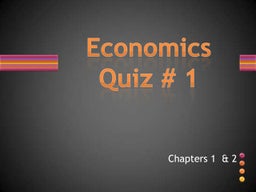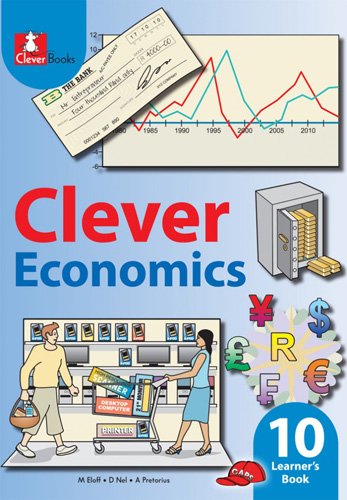Imagine this: you’re at the grocery store, debating between two brands of cereal. One is cheaper, but the other boasts a “healthier” label. Which do you choose? This seemingly simple decision, driven by factors like price, quality, and personal preferences, is actually a microcosm of economics in action. Economic principles are the invisible forces that guide our choices, shaping not only our individual lives but the global economy as a whole.

Image: www.slideshare.net
Ready to unlock the secrets of this fascinating field? This lesson quiz dives into the fundamentals of economics, exploring its history, core concepts, and real-world applications. By the end, you’ll understand how economic principles impact your daily life and gain a deeper appreciation for the interconnectedness of our global economy.
Understanding the Roots of Economics
Economics, at its core, is the study of how people make choices in a world of scarcity. We all face limited resources – time, money, and even natural resources – while our wants and needs are seemingly endless. This fundamental tension between scarcity and desire drives all economic activity.
The term “economics” itself originates from the Greek word “oikos,” meaning “house,” and “nomos,” meaning “custom” or “law.” In essence, early economists studied how households managed their resources and made decisions. It wasn’t until the late 18th and 19th centuries that economics broadened its scope to encompass national and global economies.
The Birth of Modern Economics: Adam Smith and the Invisible Hand
Considered the “father of modern economics,” Adam Smith’s 1776 masterpiece “The Wealth of Nations” revolutionized the way we think about economies. Smith argued that individuals, acting in their own self-interest, create an efficient marketplace through a system known as the “invisible hand.”
Imagine a bustling farmer’s market. Each vendor is focused on selling their produce at the best possible price. Consumers, in turn, are trying to purchase the tastiest and most affordable food. This seemingly chaotic exchange, driven by individual self-interest, ultimately leads to a balanced market where prices reflect supply and demand.
Microeconomics: Zooming In on Individual Choices
Microeconomics focuses on the decisions made by individuals, households, and businesses. It investigates factors like:
- Supply and demand: How do changes in the availability of a good or service, or changes in consumer desire, affect its price?
- Production costs: How do businesses determine the optimal amount to produce while maximizing profits?
- Market structures: How do various market conditions – from perfect competition to monopolies – influence pricing and competition?
Think back to that cereal choice. Microeconomics helps us understand why one cereal might cost more than another, or why a brand might offer a special discount to attract buyers.

Image: www.macmillaneducation.co.za
Macroeconomics: Taking a Broad View of the Global Economy
Moving beyond individual choices, macroeconomics examines the economy as a whole. It delves into topics like:
- National income and output: How is a country’s economic growth measured, and what factors influence it?
- Inflation and deflation: What causes prices to rise or fall, and how do these fluctuations affect purchasing power?
- Unemployment and employment: What factors contribute to job creation and loss, and how can economic policies be used to manage unemployment?
- Government fiscal and monetary policy: How do government spending, taxes, and interest rates influence the economy?
Macroeconomics helps us understand issues like recessions, booms, and economic disparities across different regions.
Beyond the Textbook: Economics in Action
Economics isn’t just a theoretical discipline confined to classrooms. It touches every aspect of our lives:
- Financial decisions: Understanding interest rates and investment strategies helps us make informed choices about managing our finances.
- Career choices: Economic trends and labor market conditions influence the industries we choose to work in and the skills we develop.
- International trade: Understanding the forces behind global trade allows us to appreciate the interconnectedness of the world economy.
- Environmental issues: Economic principles can be applied to address environmental challenges like climate change and resource depletion.
By applying economic principles, we can make more informed decisions about our personal finances, careers, and even the way we consume and interact with the world around us.
Expert Insights: Building a Stronger Economy
Renowned economists like Nobel laureate Paul Krugman and former Federal Reserve Chair Ben Bernanke have dedicated their careers to understanding how economies work. Their insights provide valuable lessons for anyone seeking to navigate the complexities of the global economy:
- Embrace free markets: While government intervention can play a role, a well-functioning market driven by competition and innovation is essential for economic growth.
- Invest in education and infrastructure: Building a skilled workforce and a robust infrastructure are key prerequisites for long-term economic prosperity.
- Promote global trade: Free and fair trade fosters economic growth and prosperity for all countries involved.
- Address inequality: Addressing income inequality and poverty is not just a moral imperative, it’s also economically sound. When everyone has access to opportunities, the economy benefits as a whole.
Actionable Steps: Engaging with Economics
Ready to take your understanding of economics to the next level? Here’s what you can do:
- Stay informed: Read articles, watch documentaries, and listen to podcasts that discuss current economic events and issues.
- Ask critical questions: Whenever you encounter an economic issue or decision, ask yourself how economic principles might be influencing the situation.
- Engage in discussions: Share your thoughts and perspectives on economic issues with friends, family, and colleagues.
- Consider volunteer opportunities: Many non-profit organizations address economic challenges, from poverty to access to education. Getting involved can make a real difference.
By engaging with the world of economics, you’ll not only gain a deeper understanding of how our economic system works but also become a more informed and engaged citizen.
Lesson Quiz 1-1 What Is Economics
Conclusion: A World Shaped by Choices
From the choices we make at the grocery store to the decisions made by governments and businesses, economics underlies every aspect of our lives. By understanding the key principles of economics, we can make more informed decisions, navigate challenges, and contribute to a more equitable and prosperous future.
The journey of learning about economics is an ongoing one. Embrace the curiosity, ask questions, and engage with the world around you. The more we understand the forces shaping our economy, the more empowered we become to make a positive impact on our world.






